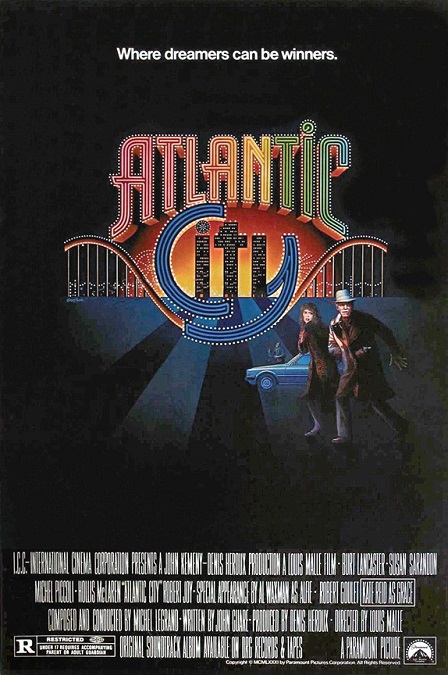
Atlantic City – 1981
OK, I’ll start this review off with a little history lesson. Atlantic City was incorporated in 1854 and was supposed to be a resort town. It was immensely popular and sported many up-scale hotels. It flourished during the Prohibition era of the 1920s, but it had a corrupt underbelly. The city began to decline, especially during the post-WWII era, when modern conveniences like automobiles became more easily available to the public. The decline went into overdrive when other things like air conditioning and swimming pools became more common among would-be summer vacationers. But the city was somewhat revitalized in 1976 when voters passed a referendum to legalize gambling.
I mention all this to set the scene for the film. The story takes place in the late 70s, during the early days of legalized gambling. The history is important because the movie really captured the personality of the run-down and disintegrating city. It really showed it as something seedy and almost crass. Though you never saw any of them, it felt like there should have been pimps and hookers prowling the streets, along with racketeers, extortionists, and drug pushers.
Susan Sarandon plays Sally Matthews, a woman who is studying to be a card dealer at a casino. Her estranged drug-dealing husband, Dave, played by Robert Joy, who had run off with her extremely child-like sister, Chrissie, played by Hollis McLaren, returns to her with a load of stolen cocaine. Along the way, Dave meets Sally’s neighbor Lou Pascal, played by Burt Lancaster. Dave is a former gangster from the Prohibition era.
And there’s the set-up. Dave enlists Lou’s help in selling the cocaine, but is killed by the men from whom he had stolen the drugs before he could collect the money from Lou. The rest of the movie follows the awkward romance between Lou and Sally as they try to evade Dave’s killers. Of course, there is a lot more to it than that, but that is the bare-bones of the main plot. There is a small sub-plot which involves Sally and Lou’s downstairs neighbor, Grace Pinza, played by Kate Reid, who pays Lou to take care of her daily needs and occasionally have sex with her. It just added to the sleazy feel of the corrupt little city.
Lancaster was nominated for Best Actor for his performance, as was Sarandon for Best Actress. They both did a great job, though I’m not sure if I would consider their performances as Oscar-worthy. Lancaster was really the stand-out member of the cast, especially in a scene where he lustily tells Sally how he habitually watches her undress through her window. It was a little creepy, but Lancaster played it in such a way as to make it seem like something more than mere perversion. He seemed to see it as something beautiful, not just the cheap thrill of a peeping-tom.
Wikipedia describes the movie as a romantic crime film, though I think I’d call it a crime-drama. I thought there was far more drama than romance and there were even a few scenes of suspense that a simple romance wouldn’t typically have. Interestingly enough, Atlantic City was 1 of 41 films in Academy Award history to be nominated for the big 5: Best Picture, Best Director, Best Actor, Best Actress, and Best Screenplay. Unfortunately, it is also 1 of 8 movies in that category to not win a single award.
But aside from all that, I’m having a difficult time liking this movie. It wasn’t a bad movie, by any means, but overall, it had a mildly depressing feel. It was a movie about unscrupulous people who were living in a town that seemed to be on the verge of death. It was clear that Atlantic City had once been beautiful, but that was all gone. It seemed that none of the characters wanted to be there. They were all looking for a way to get out.
There seemed to be very little joy in the story. The romance between Sally and Lou ended awkwardly with thievery and lies as Sally steals most of the drug-money from Lou’s wallet and leaves, presumably to be a card dealer in France, never to return to Atlantic City. It was an end that was strangely acceptable to Lou as he spies on her taking the money, and clearly does not believe her excuse for wanting to go out without him. It was an odd ending. Appropriate, but odd. Apparently, he loved her enough to let her take the cash and go. And she had given him someone to love and protect, making him feel alive, if only for a short time. Lancaster really seemed to understand the character, which is why he was so good.








